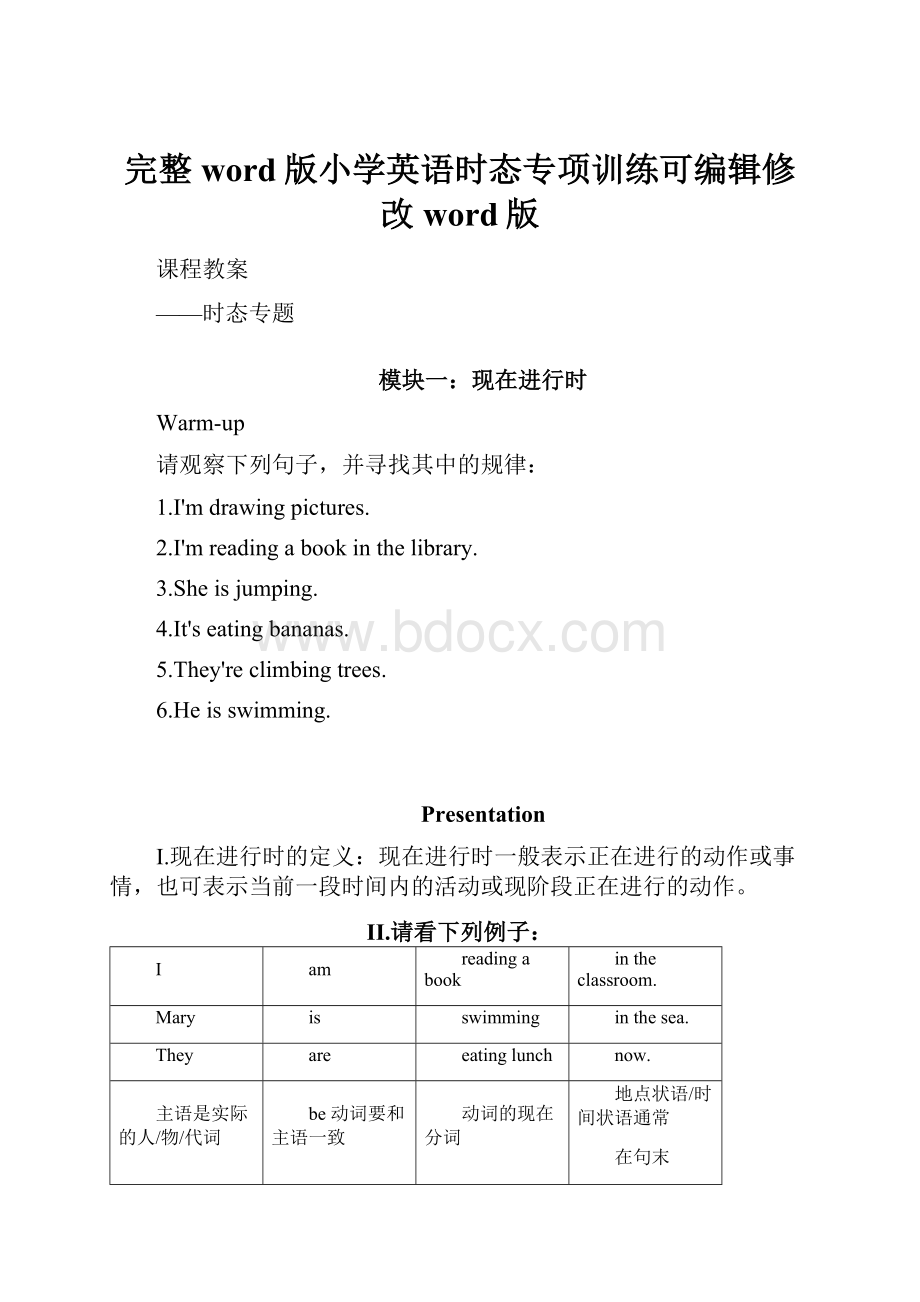完整word版小学英语时态专项训练可编辑修改word版.docx
《完整word版小学英语时态专项训练可编辑修改word版.docx》由会员分享,可在线阅读,更多相关《完整word版小学英语时态专项训练可编辑修改word版.docx(24页珍藏版)》请在冰豆网上搜索。

完整word版小学英语时态专项训练可编辑修改word版
课程教案
——时态专题
模块一:
现在进行时
Warm-up
请观察下列句子,并寻找其中的规律:
1.I'mdrawingpictures.
2.I'mreadingabookinthelibrary.
3.Sheisjumping.
4.It'seatingbananas.
5.They'reclimbingtrees.
6.Heisswimming.
Presentation
I.现在进行时的定义:
现在进行时一般表示正在进行的动作或事情,也可表示当前一段时间内的活动或现阶段正在进行的动作。
II.请看下列例子:
I
am
readingabook
intheclassroom.
Mary
is
swimming
inthesea.
They
are
eatinglunch
now.
主语是实际的人/物/代词
be动词要和主语一致
动词的现在分词
地点状语/时间状语通常
在句末
III.
句式
句型结构及例子
肯定式
主语+be(am/is/are)+动词的分词形式+其他
LucyiswatchingTVnow.
否定式
主语+be(am/is/are)+not+动词的分词形式+其他
Iamnotreadingabookintheclassroom.
一般疑问句式
Be(am/is/are)+主语+动词的分词形式+其他
—Areyouhavingapicnic?
—No,wearen’t.
—Aretheyeatingthehoney?
—Yes,theyare.
疑问词+be(am/is/are)+主语+动词的分词形式?
现在进行时的句型结构及举例:
特殊疑问句式
疑问词+be+现在分词+其他?
—Whataretheantseating?
—Honey.
★be动词的用法口诀:
我(I)用am,你(you)用are,
is连着他(he),她(she),它(it),单数名词用is,复数名词全用are。
IV.动词变成现在分词形式的规则:
变化规则
例子
一般在动词词尾加ing
talk-talking,buy-buying
辅音字母+e结尾的动词,去e+ing
make-making,write-writing
以重读闭音节结尾,且词尾为单辅音字母的动词,将词尾辅音字母双写+ing
put-putting
begin-beginning
V.常用的时间词语和短语:
now,look,listen,thesedays等…
Practice
练一练
一.写出下列动词的现在分词形式:
动词原形
现在分词
动词原形
现在分词
动词原形
现在分词
go
ride
take
draw
play
sit
collect
swim
sweep
run
have
see
sing
dance
walk
二.单项选择:
1.Listen!
Sheinthekitchen.
A.isdoingthedishesB.dothedishes
C.todothedishingD.aredoingthedishes
2.TheyTVintheevening.
A.arewatchingB.iswatchingC.watchD.watches
3.Look!
Lucyisanewbiketoday.
A.notjumpingB.notridingC.notrunningD.nottaking
4.Sheisswimmingthesedays.
A.learningB.learnC.learns
5.Thereisamonkeyunderthebigtree.
A.sitB.sittingC.issitting
6.Isshesomethingnow?
A.eatB.eatingC.ateD.eats
7.—areyoueating?
—I’meatingpears.
A.Where,anyB.What,someC.What,aD.which,some
三.用现在进行时完成下列句子:
1.—you(fly)akite?
—Yes,.
2.—he(talk)withme?
—Yes,.
3.I(sing)anEnglishsong.
4.Whathe(mend)?
5.Mymother(watchTV)inthelivingroom.
6.Look!
Therebutterflies(fly)inthesky.
7.Listen!
Thegirl(sing)inthenextroom.
四.句型转换:
1.Theyaredoinghomework.(分别改成一般疑问句和否定句)
2.Theelephantisdrinkingwater.(改成一般疑问句)
3.I’mwritingaletterinthestudy.(对划线部分进行提问)
4.WuYifanandMikeareplayingfootball.(分别改成一般疑问句和否定句)
模块二:
一般将来时
Warm-up
请观察下列句子,并寻找其中的规律:
1.Iwillmeetmybestfriendthisafternoon.
2.Shewillvisithergrandparentstomorrow.
3.TheywillgohikingnextSunday.
4.Iamgoingtomeetmybestfriendthisafternoon.
5.Sheisgoingtovisithergrandparentstomorrow.
6.TheyaregoingtogohikingnextSunday.
Presentation
I.一般将来时的定义:
表示将要发生的动作或存在的状态及打算、计划或准备做某事。
II.请看下列例子:
I
amgoingto
watchTV
thisevening
He
isgoingto
watchTV
thisevening
They
aregoingto
playfootball
afterschool.
主语可以是人或物,也可
以是人称代词
be动词要根据主语变化,
要跟主语一致
动词一定要用原形
地点状语/时间状语通常
在句末
I
will
readabook
intheclassroom.
Mary
will
goshopping
tomorrow.
They
will
eatlunch
intherestaurant.
主语是实际的人/物,可
用代词
will
动词一定要用原形
地点状语/时间状语通常
在句末
III.
句式
begoingto式
will式
肯定式
主语+begoingto+动词原形+(表示将来的时间)
Heisgoingtoplanttreesthisweekend.
主语+will+动词原形+(表示将来的时间)
Hewillplanttreesthisweekend.
否定式
主语+benotgoingto+动词原形+(表示
将来的时间)
主语+will+not+动词原形+(表示将来的
时间)
一般将来时的句型结构及举例:
WearenotgoingtowatchTVtogether.
WewillnotwatchTVtogether.
一般疑问式
Be动词+主语+goingto+动词原形+(表示将来的时间)?
AretheygoingtotakeatripthisSunday?
Will+主语+动词原形+(表示将来的时间)?
WilltheytakeatripthisSunday?
注:
be或will提到句首,some改为any,and改为or,第一二人称互换。
特殊疑问句式
特殊疑问词(what/when/who/where/how等)+一般疑问句式?
Whatareyougoingtodothisevening?
Howaretheygoingtogetthere?
III.常用的时间词语和短语:
nextweek,thedayaftertomorrow,tomorrow,nextMonday,ontheweekend,afterschool等…
IV.begoingto和will的区别:
begoingto与will都可以用来表示一般将来时。
与will相比,begoingto更强调计划性或是客观上必将发生的动作,其表示的意图通常是事先经过考虑的;而will通常带有说话人的主观想法,如表示“预见”,其表示的意图是说话时刻临时想到的。
有时两者可互换使用。
例如:
I’mgoingtobeanEnglishteacher.
OnSunday,I’mgoingtothesupermarketwithmymother.Thatwillbefun!
Youwillbebettersoon.
Practice
练一练:
一.选择题:
1.—Whatareyougoingtodoontheweekend?
—Igoingtotakeatrip.
A.amB.areC.is
2.—Hewillhisgrandfatherthisevening.
A.visitB.visitedC.visiting
3.—?
—Yes,Iam.
A.AmIgoingtothecinematomorrow
B.Areyougoingtothebookstorethisweekend
C.Ishegoingtothebookstore
5.—I’mgoingtothebirthdaypartynextweek.
—Itfun!
A.isB.willbeC.isgoingtobe
6.Marygoingtoapicturethisweekend.
A.is;paintingB.are;paintC.is;paintingD.is;paint
二.用所给词的适当形式填空:
1.Todayisasunnyday.We(have)apartythisafternoon.
2.Mybrother(go)toShanghainextweek.
3.It’sFridaytoday.Whatshe(do)thisweekend?
She(watch)TVand(catch)insects.
4.Mary(visit)hergrandparentstomorrow.
5.David(give)astampshownextMonday.
三.句型转换:
1.Myfatherandmotheraregoingtoseeaplaythedayaftertomorrow.(对画线部分提问)
goingtoseeaplaythedayaftertomorrow?
2.I’mgoingtogetupat6:
30tomorrow.(改为一般疑问句)
togetupat6:
30tomorrow?
3.I’llgoandjoinwiththem.(改为否定句)
gojointhem.
4.Wewillmeetintheparkat10:
30.(改为一般疑问句)
meetintheparkat10:
30.
5.Sheisgoingtoplayping–pongafterschool.(对画线部分提问)
sheafterschool?
6.Sheisgoingtogoswimming.(改为否定句)Shegoingtogoswimming.
四.请根据答句写问句:
1.?
Shewillgotherewithherparents.
2.?
He’llgotothegym.
3.?
I’llgotherebybus.
4.?
We’llhaveChineseclass.
5.?
They’regoingtoplayfootball.
模块三:
一般现在时
Warm-up
请观察下列句子,并寻找其中的规律:
1.Theskyisblue.
2.Igetupatsixeveryday.
3.Theearthgoesaroundthesun.
4.Heusuallygoestoschoolbybike.
5.Theyarenotstudents.
Presentation
I.一般现在时的定义:
表示通常性、规律性、习惯性的状态或者动作(有时间规律发生的事件)
的一种时间状态。
II.请看下列例子:
I
am
astudent.
He
getsup
at7:
00everyday.
They
are
myparents.
Lucy
likes
singing.
主语可以是人或物,也可以是人称代词
be动词要根据主语变化,要跟主语一致/行为动词也要根据主语的变化,当主语是三单时,动词要加s/es;当主语是非三单时,动词
用原形。
其他
III.一般现在时的句型结构及举例:
1.be动词的变化
句式
句型结构及例子
肯定式
主语+be动词(am/is/are)+其他
Iamagirl.
否定式
主语+be动词(am/is/are)+not+其他
Heisnotastudent.
一般疑问句式
Be动词+主语+其他?
Areyouaworker?
特殊疑问句式
特殊疑问词+一般疑问句?
Whereismypencil?
2.行为动词的变化
句式
句型结构及例子
肯定句
主语+行为动词+其他
WestudyEnglisheveryday.
否定句
主语+助动词(don’t/doesn’t)+动词原形+其他
Idon’tlikepork.
Hedoesn’tlikeoftenplayfootball.
一般疑问句
助动词(do/does)+主语+动词原形+其他?
Doyouoftenplayfootball?
Doesshegotoworkbybike?
特殊疑问句
疑问词+一般疑问句?
Howdoyougotoschool?
Howdoesyourmothergotowork?
IV.动词变成现在分词形式的规则:
构成规则
例词
一般情况下,直接+s
cook-cooks,live-lives,like-likes,read-reads
以s,x,sh,ch,o结尾的动词,词尾+es
watch-watches,do-does,wash-washes,go-goes
以“辅音字母+y”结尾的动词,变y为i+es
syudy-studies
V.常用的时间词语和短语:
everyday,always,often,usually,sometimes,attheweekends,onSundays等…
Practice
练一练:
一.写出下列动词的第三人称单数:
drink
go
stay
make
look
have
pass
carry
come
watch
plant
fly
study
brush
do
teach
二.用括号内动词的适当形式填空:
1.Heoften(have)dinnerathome.
2.DanielandTommy(be)inClassOne.
3.We(notwatch)TVonMonday.
4.Nick(notgo)tothezooonSunday.
5.they(like)theWorldCup?
6.Whattheyoften(do)onSaturdays?
7.yourparents(read)newspaperseveryday?
8.Thegirl(teach)usEnglishonSundays.
9.SheandI(take)awalktogethereveryevening.
10.There(be)somewaterinthebottle.
11.Mike(like)cooking.
12.They(have)thesamehobby.
13.Myaunt(look)afterherbabycarefully.
14.I(be)ill.I’mstayinginbed.
15.She(go)toschoolfromMondaytoFriday.
16.
-Whatday(be)ittoday?
-It’sSaturday
三.单项选择:
1.IthepianoonSundays.
A.playB.amplayC.playingD.plays
2.yourmotherlunchathome?
A.Do,haveB.Does,haveC.Does,hasD.Do,has
3.MyfatherinBeijingbutIinHangzhou.
A.live,livesB.lives,liveC.live,liveD.lives,lives
4.Wehavelunchat12:
00everyday.
A.doesn’tB.aren’tC.don’tD.didn’t
5.Hedoesn’tthat.
A.doesB.doC.didD./
6.youlistentoEnglishinthemorning?
A.DoB.AreC.DoesD.Am
7.—DoesJimhaveapear?
—Yes,he.
A.IsB.haveC.doD.does
8.Idon’tbreakfast,butmysister.
A.has,hasB.have,doesn’tC.has,haveD.have,does
9.—Whatshedo?
—Sheisateacher.SheFrench.
A.is,teachB.does,teachC.does,teachesD.do,teaches
10.ShefishingwithhersistereverySunday.
A.isgoingB.shallgoC.goD.goes
四.按照要求改写句子:
1.DanielwatchesTVeveryevening.(改为否定句)
2.Idomyhomeworkeveryday.(改为一般疑问句,作否定回答)
3.Shelikesmilk.(改为一般疑问句,作肯定回答)
4.Amylikesplayingcomputergames.(改为一般疑问句,作肯定回答)
5.Wegotoschooleverymorning.(改为否定句)
6.HespeaksEnglishverywell.(改为否定句)
7.Iliketakingphotosinthepark.(对划线部分提问)
8.JohncomesfromCanada.(对划线部分提问)
9.Sheisalwaysagoodstudent.(改为一般疑问句,作否定回答)
10.SimonandDaniellikegoingskating.(改为否定句)
五.改错(划出错误的地方,将正确的写在横线上)
1.IsyourbrotherspeakEnglish?
2.Doeshelikesgoingfishing?
3.Helikesplaygamesafterclass.
4.Mr.WuteachsusEnglish.
5.Shedon’tdoherhomeworkonSundays.
模块四:
一般过去时
Warm-up
请观察下列句子,并寻找其中的规律:
1.Iwasastudentlastyear.
2.Shevisitedhergrandparentslastweekend.
3.Theywatchedamovieyesterday.
4.LucywenttoShanghaithedaybeforeyesterday.
5.Wewentice-skatinglastwinter.
Presentation
I.一般过去时的定义:
表示过去某个时间发生的动作或存在的状态,常和表示过去的时间状语连用。
一般过去时也表示过去经常反复发生的动作。
II.请看下列例子:
I
was
astudent.
He
gotup
at7:
00yesterday.